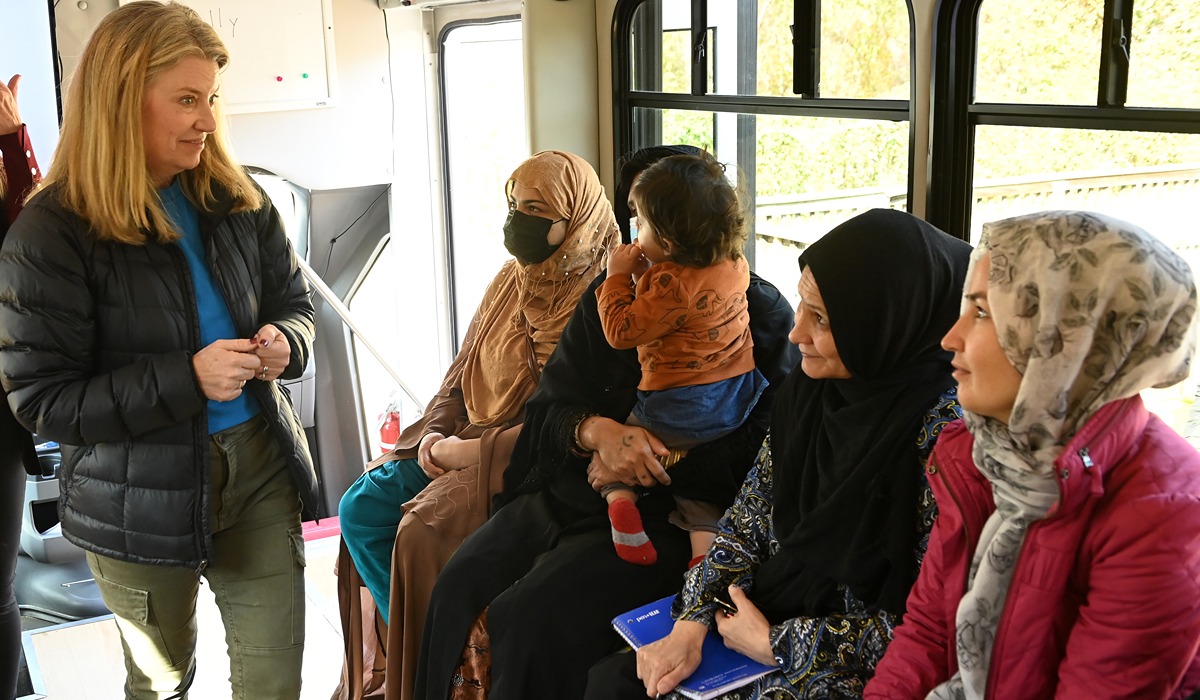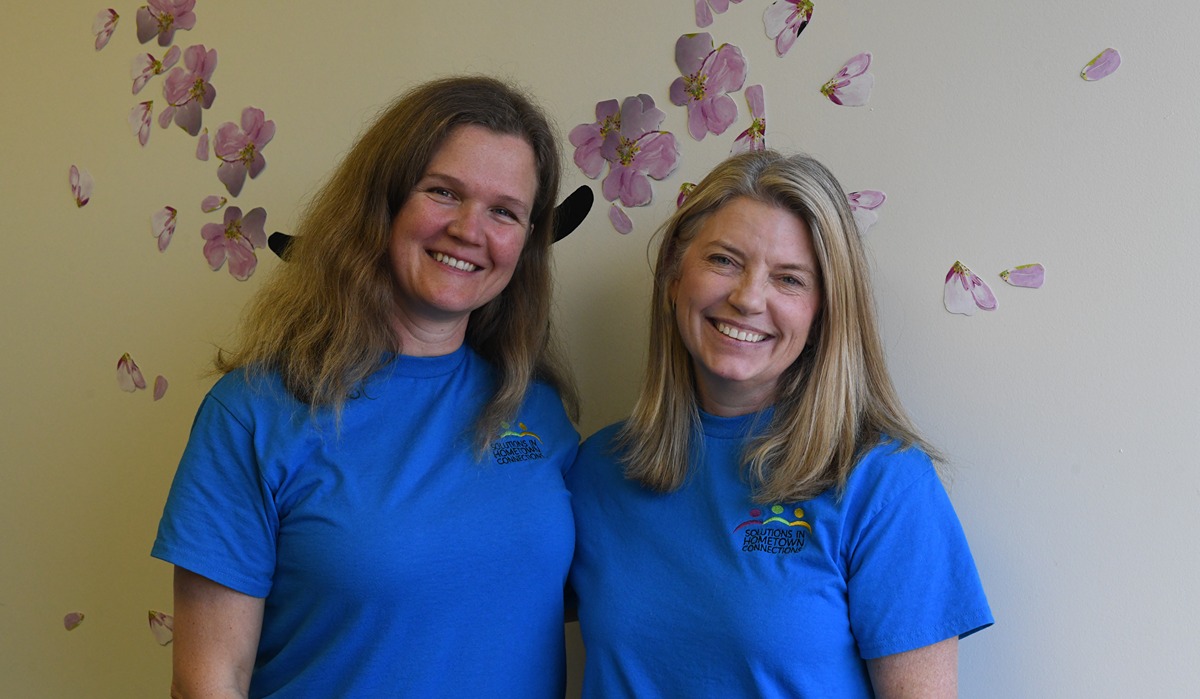

Afghan women refugees, a few holding young children, nestle side by side on cushioned benches in a small, renovated bus turned mobile classroom. A solar-powered monitor displays the words: Living in America, Week 5, an introduction to U.S. culture that this week covers acceptable small talk topics and information on trash disposal.
Before the lesson begins Leah, a teacher, aided by Marzia, a translator, announces optional screenings to identify signs of possible developmental delays in children. The women also practice small talk in English. “I like your scarf.” “I like your hair.”
Outside, children play on colorful carpets set on the sidewalk, part of free childcare services. After the lesson, everyone gathers to share a walnut cake made by one of the refugees.
This Welcome Workshop is a program of the nonprofit Solutions in Hometown Connections (SHC), founded in 2017 by Merritt Groeschel, J.D. 2013, and Kate (Teeling) Talbot, B.A. 1990, to empower refugee families in the Washington metro area through education and personalized support.
Groeschel and Talbot met through a tutoring group that assisted newcomers in nearby Maryland. In 2015, Groeschel and her family sponsored a Syrian refugee family. She discovered that once refugees are resettled, they are not connected to the broader community and resources.
“We realized that there was a real gap in services and we came in to fill that gap,” Talbot said of SHC. “A lot of individuals, especially women with lower literacy, were literally left at home and literally left behind.”
Starting with about 10 students enrolled in classes in 2018, SHC today has 360 students taking online or in-person programs, including English learning, preschool, citizenship preparation, and the mobile Welcome Workshops that travel to refugees’ apartments.
“That’s our way of reaching the most isolated people who don’t have the digital literacy skills yet, who maybe don’t have the confidence to leave their community. We see ourselves as a bridge,” Talbot said.

Merritt Groeschel, J.D. 2013, left, and Kate (Teeling) Talbot, B.A. 1990, right, founded Solutions in Hometown Connections to empower refugee families in the Washington metro area through education and personalized support. (University Photo/Patrick G. Ryan)
SHC has assisted over 2,000 refugees; the majority are from Afghanistan. Program funding comes from grants from the Maryland Office for Refugees and Asylees while operational costs are covered by fundraising.
The organization also relies on hundreds of volunteers from local churches, synagogues, mosques, high schools, and universities. SHC employs a staff of 24; many are former students.
“We’re giving them a step to go somewhere else” in the future, Groeschel said. “We’ve been able to hire several women who have never worked outside of the home, but since we’re going into their apartment complex, we’re able to hire them to work for a few hours a week while we’re doing classes.”
SHC also provides legal referrals through the Immigrant and Refugee Advocacy Clinic at Catholic University’s Columbus School of Law.
Stacy L. Brustin, clinic director, said that it is “rewarding for me to partner with SHC, having supervised Merritt Groeschel when she was a student attorney working in the Civil Practice Clinic during her time at CUA.”
About two students per semester are referred. Professors and students work to obtain Special Immigrant Visa status, humanitarian parole, and family reunification for SHC Afghan families. Students also conduct “Know Your Rights” presentations to assist families grappling with complex immigration application and interview procedures, Brustin said.
“The collaboration with SHC was key,” Brustin said. “Merritt and her team helped secure financial sponsors and social services support so that our clients could pursue their legal claims.”
Groeschel said her own time working in the legal clinic was an experience “I still draw from.” She said her path was nontraditional as she was a mother of three and had been out of school for 10 years. She had her fourth child during her third year of law school and felt moved that the University allowed her to return to school.
Kate Talbot has strong family connections to the University, as her husband Greg Talbot, J.D. 1997; her mother-in-law, Barbara Talbot, B.A. 1966, M.A. 1978; and her father-in-law, Robert J. Talbot, B.A. 1960, are all alumni. (The baseball field bears his name – Robert J. Talbot Field.)
Kate, who studied English, said her time at the University shaped who she is today and provided the support, friendship, and shared values that are important to her.
“When I went to Catholic University in ‘86, it was a new community. I was away from home for the first time. And you’re unsure of where everything is, how to get places, living in a city for the first time. But that community that I met, and the people I met, I am still close to today,” she said. “That is something I carry with me.”